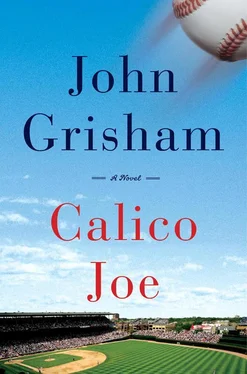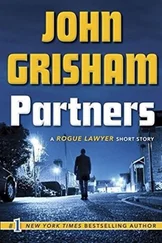I look at her and say, “Say, Agnes, I have a few things I need to discuss with Warren in private. You know, family stuff, rather personal. Could the two of us have a few minutes?”
She does not like this at all, but Warren smiles and nods his head at the door. She huffs out of the den, closing the door behind her. I reach over, take the remote, turn off the television, sit back down, and say, “Guess who I saw this morning, Warren?”
“How should I know?”
“Always the smart-ass, right?”
“Always, yes.”
“Joe Castle, that’s who. I was in Calico Rock yesterday afternoon and last night, and this morning I saw Joe.”
“I suppose you were just passing through.”
“No, not at all. I went there for the purpose of seeing him.”
His shoulders sag a little as the air gets heavier. I am staring at him, but he has found something on the floor to hold his gaze. A minute passes, then another. He finally grunts and says, “Something you want to say?”
I move closer to him and sit on the edge of the coffee table. Two feet away, I realize how little sympathy I have for this dying old man. There is far more anger than pity, but I promised myself I would not visit our past. “I want you to go see Joe, Warren. Now, before it’s too late, before you pass away, before he passes away. There will never be another time like now. Go, sit down with him, offer a hand, offer the truth, offer an apology, at least attempt to close this story.”
He frowns as if in severe pain. He looks at me as his mouth falls open, and for a while he cannot speak.
“I’m serious, Warren. You have lied for thirty years about what happened, but you and I both know the truth. For once in your miserable life, stand up and admit you’re wrong, apologize. You’ve never reached out to him. You would never face him. You would never face the truth, quite the opposite. You’ve lied and lied and lied until you probably believe your own lies. Stop the lying, tell Joe the truth, and tell him you’re sorry.”
“You got a lot of guts coming here with this crap,” he snarls.
“I have far more guts than you, old man. If you had a backbone, you would go see him. I’ll go with you. We’ll make the journey together, and when it’s over, you’ll feel a lot better about yourself.”
“Aren’t you the wise one?”
“I am, on this matter anyway.”
His pale face has reddened with anger, but he holds his tongue. Another minute passes. “What did you say to him?” he asks.
“Nothing. We didn’t speak. I saw him from a distance. He walks with a bad limp, and a cane, thanks to you.”
“I did not intend to hit him.”
I raise both hands and laugh. “Here we go again. The biggest lie in the history of organized baseball, and what’s worse, everyone knows it’s a lie, including both of us.”
“Get out of my house!”
“I will in a minute. Let’s face the truth, Warren. You won’t make it to Christmas. The odds are heavily against you. When you die, those who know you are not going to say things like: ‘Good ole Warren, he loved his kids.’ Or, ‘Good ole Warren, what a generous soul.’ Or, ‘Warren truly loved his wives.’ Nothing like that, Warren, because it doesn’t fit. The one thing that will be mentioned in your obituary, if you have one at all, is the fact that you threw the most famous beanball in the history of the game. And in doing so, you deliberately destroyed one of the most promising careers of all time. That’s what they’re gonna say, Warren, and you can’t do a thing about it.”
“Please leave.”
“I’ll be happy to leave, Warren, just let me finish. You can never undo the misery you created—the neglected kids, the tormented son, the abused wife, the alcoholism, the philandering, the long trail of debris you’ve left behind. Can’t fix it, Warren, even if you are so inclined, which I’m sure you are not. But there is one person you can reach out to and perhaps make his life a little brighter. Do it, Warren. Do it for Joe. Do it for yourself. Do it for me.”
“You’ve lost your mind.”
I reach into my jacket and remove some folded papers. “I want you to read this, Warren. It’s titled ‘The Beaning of Joe Castle’ by Paul Tracey, son of Warren. I wrote it many years ago, and I’ve revised it a thousand times. Every word is true. My plans are to get it published as soon as possible after your death. I’ll start with Sports Illustrated , Baseball Monthly , the newspapers in Chicago, not sure after that, but I’ll bet somebody will want to print it. I don’t want a dime. I want the truth to be known.” I drop the papers onto his lap. “The only way to prevent this from being published is to go with me to Calico Rock and see Joe.”
“Blackmail?”
“You got it, Warren. Old-fashioned blackmail, but for a good reason.”
I toss a business card onto the sofa and say, “I’m at the Best Western down the road. If you want to talk, I’ll meet you at your favorite spot, Wink’s Waffles, at nine in the morning.”
He was scratching his forehead when I left the room. I did not see Agnes on the way out.
* * *
I check into the Best Western, call home and chat with Sara, then head downstairs to find something to eat. The restaurant is empty and uninviting, but there are a few salesmen swapping stories over drinks in a lounge. I choose a table, order a sandwich and a glass of tea, and notice a television in a corner. The Cubs are playing the Mets with the sound on mute. I stare at it, the first baseball game I’ve watched in thirty years.
16

On September 8, 1973, Warren Tracey started against the Padres in San Diego. He walked two in the first inning but got out of trouble with a bases-loaded double play. He walked two more in the second, then gave up back-to-back doubles. On the air, Ralph Kiner referred to his pitching as “batting practice.” By the time Yogi Berra pulled him, the Padres had a five-run lead and two runners on, and the Mets, who had won eight of their last ten, were in trouble.
In his last three starts, Warren had completed just three innings, given up seventeen runs on twelve hits, walked thirteen, and had an ERA that approached triple figures. Since hitting Castle, he had lost his ability to throw inside, and every hitter in the National League knew it. The New York sportswriters and fans were screaming for his head, and it was obvious the Mets had to do something. The team was winning, with the exception of Warren, and there was open speculation about who would replace him in the rotation.
And there was more pressure. On September 15, the Mets were scheduled to arrive in Chicago for a three-game series, and there was an excellent chance that the sight of Warren Tracey on the field at Wrigley would lead to bloodshed. The death threats were pouring in—to the Mets home office, in anonymous letters to the editors, to the homes of some of the Mets players. The Chicago sportswriters were speculating about how dangerous Wrigley would be if the Mets were foolish enough to put Tracey on the mound. Commissioner Bowie Kuhn was watching the situation closely.
On September 14, three weeks after the beaning, the Mets released Warren Tracey.
* * *
Of course, my father did not call home with the news that he had been cut from the roster. That would have required some maturity and courage on his part. The Mets were in L.A., and as I tuned in for the pregame show, I heard Lindsey Nelson and Ralph Kiner talking about the decision by the Mets front office to get rid of Warren Tracey. He had pitched himself out of a job, and they spent some time recapping his season and career. A month earlier, he had a record of seven and seven and was pitching effectively. But since the Castle incident, he had been a disaster.
Читать дальше












